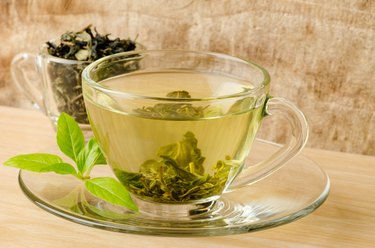
Green tea's reputation as a health food is well-deserved -- it's hydrating, low in calories and packed with antioxidants. Because it's minimally processed, it's higher in beneficial catechins than oolong or black teas, with about 240 to 320 milligrams per cup of tea. The combination of these catechins and caffeine may slightly increase weight loss, but it's not likely to make a significant difference or compensate for a high-calorie diet or sedentary lifestyle. To lose weight more quickly, you'll need to cut calories and exercise more often in addition to drinking green tea.
Green Tea and Weight Loss
Video of the Day
Green tea may slightly increase weight loss. Drinking green tea might bring about a bit of extra weight loss, according to a study published in 2010 in the Journal of the American College of Nutrition. The researchers found that people who drank 4 cups of green tea per day lost 5.5 pounds more over the course of the 8-week study compared to people who drank the same amount of water. Another study, published in 2008 in Physiology & Behavior, noted that people who drank green tea lost about 7 pounds more than people who drank a placebo during the course of the 12-week study, through a combination of enhanced fat burning and increased metabolism brought on by the green tea.
Video of the Day
Caffeinated Vs. Decaffeinated Green Tea
The caffeine and the catechins found in green tea have a synergistic effect potentially resulting in increased fat burning and energy expenditure, according to a review article published in 2010 in The Journal of Nutrition Biochemistry. Thus, decaffeinated green tea isn't as likely to bring about the same benefits for weight loss as regular green tea. A study published in the Journal of Human Nutrition and Dietetics in 2010 using decaffeinated green tea found that there was a slight but insignificant weight loss -- about 2.5 pounds over six months -- associated with drinking decaffeinated green tea. These results hint that you aren't going to lose a lot more weight by drinking decaffeinated green tea.
Choosing the Right Additions
Those who don't like plain green tea sometimes add things like milk, honey, sugar or lemon to make the taste more to their liking. Some of these additions might hinder your weight loss, however. For example, a study published in 2011 in Nutrients found that the proteins in milk counteract the effects of green tea on metabolism, thus limiting its weight-loss benefits. Lemon juice, which has only 7 calories per ounce, may be a better flavoring for green tea if you're trying to lose weight.
When it comes to sweetening your tea, honey may be a better choice than sugar, though you'll need to measure your portion to avoid taking in too many calories. Each tablespoon of honey has about 64 calories. An animal study published in Nutrition Research in 2011 noted that rats given food sweetened with honey gained less weight and ate less overall than those given food sweetened with sugar. It isn't clear whether these same effects occur in people, however. A small study published in 2010 in the "Journal of the American College of Nutrition" noted that while honey affected the levels of appetite hormones in women, it didn't necessary change the amount of food they ate or increase their metabolisms.
Increasing Results With Exercise
Increasing the amount of time you spend exercising can help you lose weight, especially if you get at least 300 minutes each week of cardio and at least two strength-training sessions per week. Just like the combination of catechins and caffeine cause increased weight-loss benefits, the combination of drinking green tea and exercising may have even more beneficial effects than you might expect. A study published in 2009 in The Journal of Nutrition found that the catechins in green tea help to enhance abdominal fat loss brought on by exercising.
Caffeine may improve exercise performance and lower perceived exertion during exercise, according to a meta-analysis published in the Scandinavian Journal of Medicine & Science in Sports in 2005, potentially making caffeinated green tea more helpful than decaf. So if green tea alone isn't going to give you the weight loss results you're looking for, you may want to fit in a few more workouts to speed up your weight loss.
- Pharmacological Research: Laboratory Studies on Weight Control and Prevention of Metabolic Syndrome by Green Tea
- Journal of the American College of Nutrition: Green Tea Supplementation Affects Body Weight, Lipids, and Lipid Peroxidation in Obese Subjects with Metabolic Syndrome
- Physiology & Behavior: Effectiveness of Green Tea on Weight Reduction in Obese Thais: A Randomized, Controlled Trial
- The Journal of Nutritional Biochemistry: Antiobesity Effects of Green Tea Catechins: A Mechanistic Review
- Journal of Human Nutrition and Dietetics: Green Tea Improves Metabolic Biomarkers, Not Weight or Body Composition: A Pilot Study in Overweight Breast Cancer Survivors
- The Journal of Nutrition: Green Tea Catechin Consumption Enhances Exercise-Induced Abdominal Fat Loss in Overweight and Obese Adults
- Nutrients: Consumption of Milk-Protein Combined With Green Tea Modulates Diet-Induced Thermogenesis
- Journal of the American College of Nutrition: Effect of Honey Versus Sucrose on Appetite, Appetite-Regulating Hormones, and Postmeal Thermogenesis
- Nutrition Research: Honey Promotes Lower Weight Gain, Adiposity, and Triglycerides Than Sucrose in Rats
- Drugs.com: Exercise for Weight Loss: Calories Burned in 1 Hour
- USDA National Nutrient Database: Honey
- Scandinavian Journal of Medicine & Science in Sports: Effects of Caffeine Ingestion on Rating of Perceived Exertion During and After Exercise: A Meta-Analysis